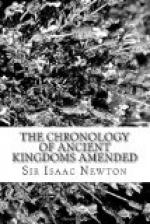1080. Lycaon the son of Pelasgus builds Lycosura; Phoroneus the son of Inachus, Phoronicum, afterwards called Argos; AEgialeus the brother of Phoroneus and son of Inachus, AEgialeum, afterwards called Sicyon: and these were the oldest towns in Peloponnesus. ’Till then they built only single houses scattered up and down in the fields. About the same time Cecrops built Cecropia in Attica, afterwards called Athens; and Eleusine, the son of Ogyges, built Eleusis. And these towns gave a beginning to the Kingdoms of the Arcadians, Argives, Sicyons, Athenians, Eleusinians, &c. Deucalion flourishes.
1070. Amosis, or Tethmosis, the successor of Misphragmuthosis, abolishes the Phoenician custom in Heliopolis of sacrificing men, and drives the Shepherds out of Abaris. By their access the Philistims become so numerous, as to bring into the field against Saul 30000 chariots, 6000 horsemen, and people as the sand on the sea shore for multitude. Abas, the father of Acrisius and Proetus, comes from Egypt.
1069. Saul is made King of Israel, and by the hand of Jonathan gets a great victory over the Philistims. Eurotas the son of Lelex, and Lacedaemon who married Sparta the daughter of Eurotas, Reign in Laconia, and build Sparta.
1060. Samuel dies.
1059. David made King.
1048. The Edomites are conquered and dispersed by David, and some of them fly into Egypt with their young King Hadad. Others fly to the Persian Gulph with their Commander Oannes; and others from the Red Sea to the coast of the Mediterranean, and fortify Azoth against David, and take Zidon; and the Zidonians who fled from them build Tyre and Aradus, and make Abibalus King of Tyre. These Edomites carry to all places their Arts and Sciences; amongst which were their Navigation, Astronomy, and Letters; for in Idumaea they had Constellations and Letters before the days of Job, who mentions them: and there Moses learnt to write the Law in a book. These Edomites who fled to the Mediterranean, translating the word Erythraea into that of Phoenicia, give the name of Phoenicians to themselves, and that of Phoenicia to all the sea-coasts of Palestine from Azoth to Zidon. And hence came the tradition of the Persians, and of the Phoenicians themselves, mentioned by Herodotus, that the Phoenicians came originally from the Red Sea, and presently undertook long voyages on the Mediterranean.




